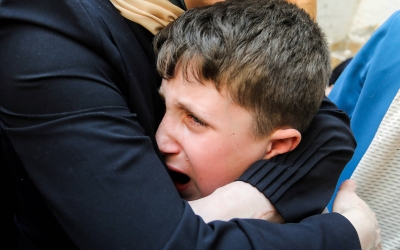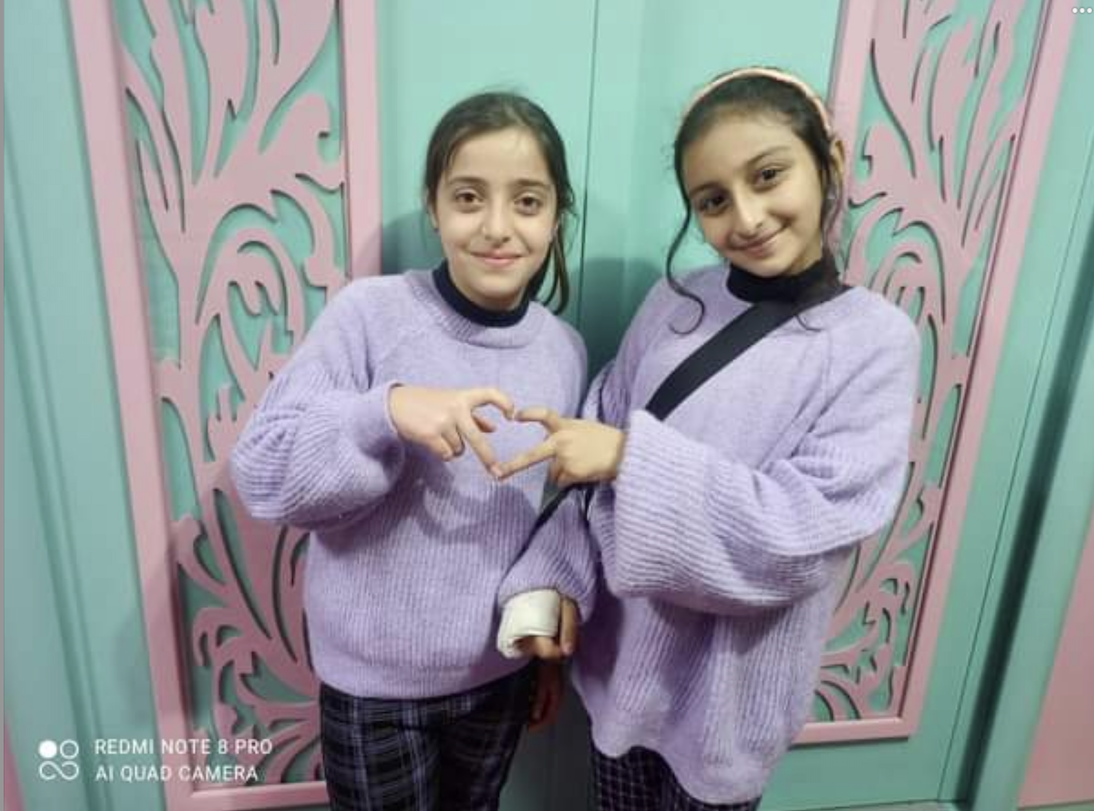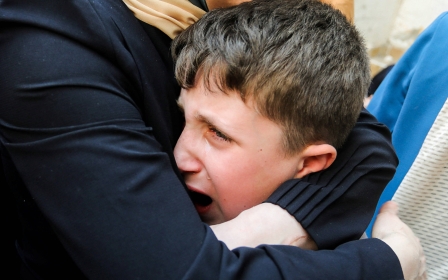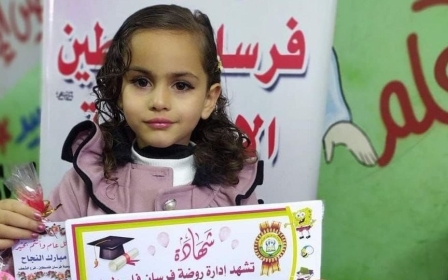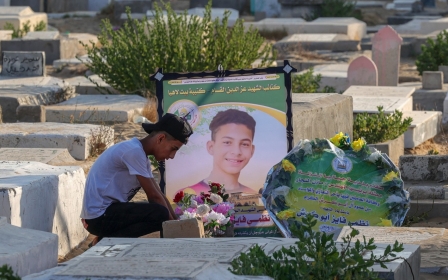Every parent in Gaza lives with the fear of losing a child at any moment
The air hung heavy as an overwhelming sense of dread permeated my bedroom and a feeling of unease crawled over my skin. At around 2 am (23.00 GMT) on Tuesday, 9 May, the violent shaking from the bombing outside woke me up.
I checked my phone and my worst fears were confirmed when I saw the news that the Israeli military was once again attacking Gaza. My area in particular was in grave danger of becoming the next target of Israeli warplanes.
As a journalist myself, I took to Twitter to let the world know what was happening.
Israel's fighter jets returned, performing their lethal dance above our heads. Over the past 16 years, the sound of jets hovering above, drones buzzing, and bombs exploding over buildings have served as a constant reminder of how precarious life is in Gaza.
After hearing reports of the targeted killing of several Palestinian Islamic Jihad (PIJ) commanders in Gaza, many people began to fear that another war was imminent.
New MEE newsletter: Jerusalem Dispatch
Sign up to get the latest insights and analysis on Israel-Palestine, alongside Turkey Unpacked and other MEE newsletters
Killed as they slept
Yesterday's horrifying statistics are an indication of the escalating violence. According to the Palestinian Ministry of Health, Israeli air strikes in the early morning hours claimed the lives of 15 Palestinians, including four women and four children.
The tragedy of killing people dedicated to healing and compassion further underscores the senseless nature of Israel's violence
Among the casualties was a prominent dentist, Dr Jamal Khaswan, who served as chairman of the board of Al-Wafaa Hospital, his wife Mervat, and their 20-year-old son Youssef, a medical student.
The family was killed when the ceiling of their home collapsed as they slept. As reported by Reuters, Dr Khaswan was "known for offering free treatment to poor families".
The tragedy of killing people dedicated to healing and compassion further underscores the senseless nature of Israel's violence.
At least 20 others were wounded in the recent attack, with many in critical condition. These numbers are expected to rise as the air strikes persist and rescue teams continue to search through the rubble.
I thought about the previous wars in 2008-2009; 2012; 2014; 2021; and 2022 and the memories of innocent lives lost, including children and women.
Parents in Gaza die twice
I've always known that the uncertainty of life in Gaza is a heavy burden for a parent, and the fear of losing a child at any moment is a constant nightmare. But it was after my daughter Sarah was born nearly a year ago that what I knew in the abstract became ever more real.
As a parent, facing these wars and dealing with their aftermath can feel debilitating. When I look into my child's eyes, I can't help but feel the weight of our situation, wondering what her future will hold or if she will even have one; if her hopes and dreams will be replaced with fear and loss, grief and trauma.
Tension hangs heavy in the night air as the sounds of explosions reverberate throughout the area. All over Gaza, parents are huddled tightly together with their children, doing their best to protect them and assure them they will be okay despite knowing in their hearts that there is no guarantee.
With each new attack, the spectre of death draws closer, casting a pall over our lives and the dreams we hold dear for our children.
The recently published heartbreaking scenes and images of innocent children killed in their sleep are a stark reminder of the fragility of life in Gaza. My heart aches for the children whose laughter has been silenced forever - children like Mayar Ezz el-Din, 11, her brother, Ali, eight, and Hajar al-Bahtini, five.
Family members of Mayar and Ali shared on social media that, a few hours before the children's deaths, they had spent hours on Monday evening choosing the perfect outfits for their school trip the next morning and chattering endlessly about the adventures that await them and their friends.
They went to bed early after planning every detail for their field trip - a special day that includes visits to historical sites in Gaza, the zoo, and dining at a restaurant - which children look forward to all year. For Mayar, Ali, and their surviving classmates, this day never came.
Their friends, whose parents hesitated to tell them why their school trip was cancelled, are now left to grapple with this unbearable loss. The mother of Tuqa, a close friend of Mayar, shared on Facebook the devastation her daughter felt at the news, describing her "heartbreak" as a "pain she will never overcome".
As I experienced myself over the course of several wars on Gaza, the children must now find solace in the memories of their friends - Mayar's infectious laughter and the way her eyes sparkled with curiosity and mischief. As they walk through the now-empty hallways, they will feel the haunting absence of their friend's smile and the warmth she brought to their lives.
The school trip the siblings were looking forward to will forever be a cruel reminder of dreams unfulfilled. Mayar and Ali's expressions of joy, memorialised in the photos circulating online, signify a beacon of light in the dark shadows of war. Such images are not only now etched in the hearts of their teachers and friends, but all who value Palestinian life.
Is my child next?
The reality of parenthood in a war-torn place like Gaza means a constant struggle between hope and despair. Yet, death, to us, feels easier than imagining that your child could be next.
Every day, we are confronted with the grim proof of our fractured existence: the bombed-out buildings, the makeshift hospitals, and the shattered lives of our friends and neighbours.
In the quiet moments between the chaos, I watch my infant sleep, her chest rising and falling with each gentle breath. I marvel at her innocence and her capacity for joy and wonder in a world that has shown the children of Palestine so little kindness.
As I look into my child's eyes, I see a flicker of the dreams she carries within her: dreams of a life free from the constant threat of violence
As I look into my child's eyes, I see a flicker of the dreams she carries within her: dreams of a life free from the constant threat of violence, of a world where she can grow and thrive without fear.
These tragedies pierce my heart like a dagger, and the pain never really goes away. I can't help but put myself in the shoes of parents forced to bury their children, whose hopes, dreams, and laughter were snuffed out by the inhumane mechanisms of war.
Feeling this causes me a great deal of emotional distress, often oscillating between anger, sadness, and a profound feeling of helplessness.
For a refugee like me, whose grandfathers were among those who escaped death in the destroyed town of Barbara (now a part of Ashkelon), the continued bombings are a sobering reminder that the Nakba is not over.
As we mark 75 years of the Nakba this month, we recognise that the catastrophe of losing our homeland in 1948 continues to shape our lives and our ongoing fight for justice.
But even in the face of overwhelming adversity, when the weight of our circumstances threatens to crush us beneath its oppressive force, we will teach our children the importance of love, compassion, and resilience, and instill in them the values that will help them not only survive but also thrive.
As a father, a Gazan, and a human being, I refuse to let the darkness of Israel's aggression extinguish the light of hope that burns within me. I will continue to dream, hope, and work towards a better future for my child and for all the children of Gaza.
And though the path ahead may be fraught with danger and uncertainty, I will walk it with my head held high, my heart filled with love, and my eyes fixed firmly on the horizon, where the promise of a new dawn awaits us - or at least, awaits our children.
That's what every parent would say.
The views expressed in this article belong to the author and do not necessarily reflect the editorial policy of Middle East Eye.
Middle East Eye delivers independent and unrivalled coverage and analysis of the Middle East, North Africa and beyond. To learn more about republishing this content and the associated fees, please fill out this form. More about MEE can be found here.



